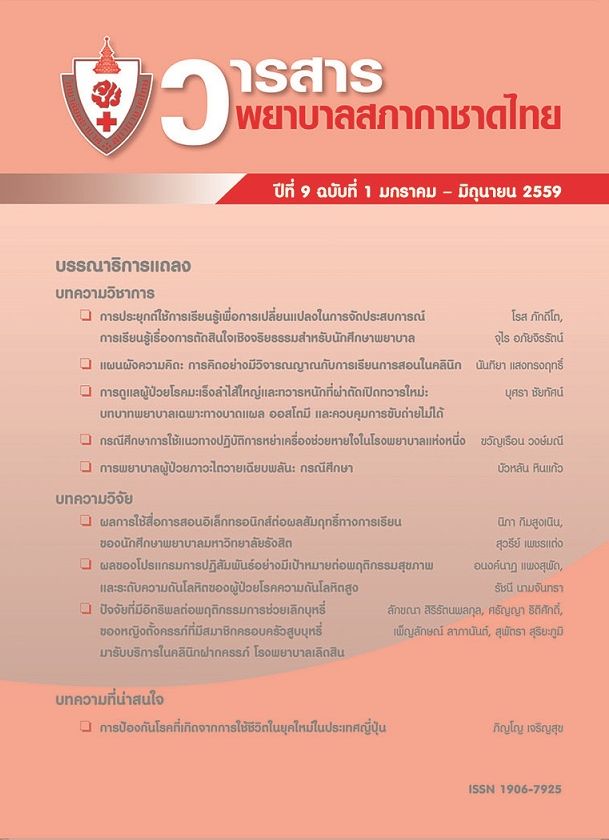ผลของโปรแกรมการปฏิสัมพันธ์อย่างมีเป้าหมายต่อพฤติกรรมสุขภาพและระดับความดันโลหิตของผู้ป่วยโรคความดันโลหิตสูง
Keywords:
การปฏิสัมพันธ์อย่างมีเป้าหมาย, พฤติกรรมสุขภาพ, ความดันโลหิตสูง, transaction, health behaviors, hypertensionAbstract
การศึกษาครั้งนี้เป็นการวิจัยกึ่งทดลอง ศึกษากลุ่มเดียววัดก่อนและหลังการทดลอง มีวัตถุประสงค์เพื่อศึกษาผลของโปรแกรมการปฏิสัมพันธ์อย่างมีเป้าหมายต่อพฤติกรรมสุขภาพและระดับความดันโลหิตของผู้ป่วยโรคความดันโลหิตสูง กลุ่มตัวอย่างเลือกอย่างเจาะจงจากผู้ป่วยที่มารับบริการที่คลินิกโรคเรื้อรัง โรงพยาบาลส่งเสริมสุขภาพตำบลบ้านเหล่าใหญ่ อำเภอมหาชนะชัย จังหวัดยโสธร โดยใช้แบบคัดกรองโอกาสเสี่ยงเบื้องต้นต่อการเกิดอัมพฤกษ์และอัมพาตของกระทรวงสาธารณสุข กลุ่มตัวอย่าง 14 คนที่มี ความเสี่ยงในระดับปานกลางถึงสูงมากและมีระดับความดันซิสโตลิคมากกว่าหรือเท่ากับ 140 มิลลิเมตรปรอท และ / หรือความดันไดแอสโตลิคมากกว่าหรือเท่ากับ 90 มิลลิเมตรปรอท กลุ่มตัวอย่างได้รับโปรแกรมการปฏิสัมพันธ์อย่างมีเป้าหมายตามทฤษฎีการบรรลุเป้าหมายของคิง เป็นเวลา 8 สัปดาห์ เครื่องมือที่ใช้ในการเก็บข้อมูล ได้แก่ แบบสอบถามพฤติกรรมสุขภาพซึ่งประกอบด้วย พฤติกรรมสุขภาพด้านการรับประทานอาหาร ด้านการรับประทานยาและการมาตรวจตามนัด ด้านการออกกำลังกาย ด้านการจัดการความเครียด และด้านการหลีกเลี่ยงปัจจัยเสี่ยง เก็บข้อมูลก่อนได้รับโปรแกรมฯ และหลังได้รับโปรแกรมฯ ในสัปดาห์ที่ 8 และ 12 วิเคราะห์ข้อมูลโดยใช้สถิติเชิงพรรณนา Repeated Measures ANOVA และ Friedman’s test
ผลการวิจัยพบว่า กลุ่มตัวอย่างมีคะแนนเฉลี่ยพฤติกรรมสุขภาพโดยรวมหลังได้รับโปรแกรมการปฏิสัมพันธ์อย่างมีเป้าหมาย ในสัปดาห์ที่ 8 และ 12 สูงกว่าก่อนได้รับโปรแกรมฯ อย่างมีนัยสำคัญทางสถิติ (p < .001) คะแนนพฤติกรรมสุขภาพด้านการรับประทานอาหาร และด้านการออกกำลังกายในสัปดาห์ที่ 8 และ 12 สูงกว่าก่อนได้รับโปรแกรมฯ อย่างมีนัยสำคัญทางสถิติ (p < .05, .01 ตามลำดับ) ระดับความดันซีสโตลิคหลังได้รับโปรแกรมฯ ในสัปดาห์ที่ 8 และ 12 ต่ำกว่าก่อนได้รับโปรแกรมฯ อย่างมีนัยสำคัญทางสถิติ (p < .01) และหลังได้รับโปรแกรมฯ ในสัปดาห์ที่ 12 ต่ำกว่าสัปดาห์ที่ 8 อย่างมีนัยสำคัญทางสถิติ (p < .05)
ผลการศึกษาในครั้งนี้เป็นแนวทางในการปฏิบัติงานของพยาบาลในการดูแลผู้ป่วยโรคความดันโลหิตสูง เพื่อปรับพฤติกรรมสุขภาพ ควบคุมระดับความดันโลหิต และป้องกันการเกิดภาวะแทรกซ้อนจากโรคความดันโลหิตสูง
Effects of a Transaction Program on the Health Behaviors and Blood Pressure Levels of Patients with Hypertension
This quasi-experimental research on one group using a pre-posttest design aimed to study the effects of a transaction program on the health behaviors and blood pressure levels of patients with hypertension. The sample were purposive sampled from patients who attended the Chronic Disease Clinic, Ban Lao Yai’s Health Promotion Hospital, Mahachanachai District, Yasothon Province. The sample comprised 14 patients who were at moderate to very high risk screened by the possibility of risk for stroke assessment tool of the Ministry of Public Health and had blood pressure levels > 140/90 mmHg. They had undergone the transaction program developed from King’s theory of Goal Attainment for 8 weeks. The research instruments for data collection were health behavior questionnaires including eating, adherence to treatment and follow-up, exercise, stress management, and avoiding risk factors. The health behaviors and blood pressure levels of the sample were collected before entering the program, and after receiving the program at the 8th and 12th weeks. Data were analyzed using descriptive statistics, repeated measures ANOVA, and Friedman’s test.
The results revealed that after receiving the transaction program in the 8th and 12th weeks, the sample had average overall health behaviors’ scores significantly higher than that before the program (p<.001). Eating and exercise behavior scores after receiving the program in the 8th and 12th weeks were significantly higher than those before the program (p<.05, .01 respectively). Systolic blood pressure levels of the sample in the 8th and 12th weeks after the program were significantly lower than those before the program. Systolic blood pressure levels in the 12th week were also significantly lower than those in the 8th week (p < .05).
The results of this study can provide a guideline for nursing practice in caring for patients with hypertension to adjust their health behaviors, to control their blood pressure levels, and to prevent complications arising from hypertension.
Downloads
Issue
Section
License
เนื้อหาบทความหรือข้อคิดเห็นต่างๆ ในวารสารพยาบาลสภากาชาดไทยนี้ เป็นความคิดเห็นของผู้เขียนบทความ ไม่ใช่ความเห็นของกองบรรณาธิการ หรือสถาบันการพยาบาลศรีสวรินทิรา สภากาชาดไทย






